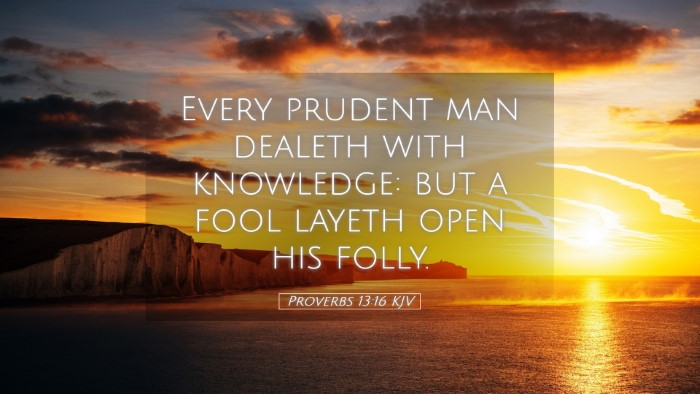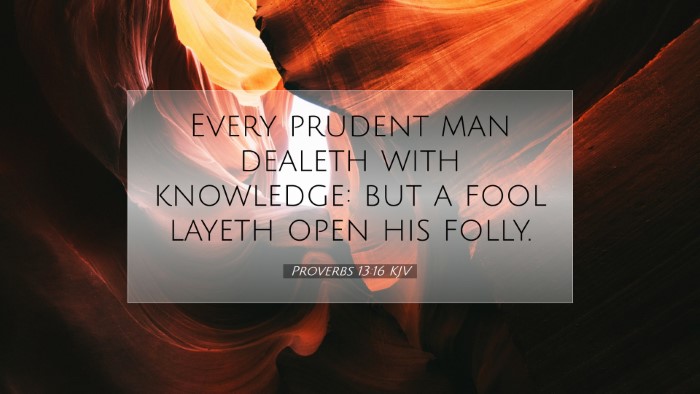Commentary on Proverbs 13:16
Verse: "Every prudent man acteth with knowledge: but a fool layeth open his folly."
Contextual Understanding
The book of Proverbs is a compilation of wisdom literature primarily attributed to Solomon, designed to impart practical wisdom for daily living. Proverbs 13:16 continues this theme by contrasting the behaviors and outcomes of the prudent and the foolish. Understanding this verse requires insight into the characteristics of a prudent man versus a fool.
Insights from Matthew Henry
Matthew Henry emphasizes that prudence is demonstrated through knowledge and discretion. He notes that a prudent man carefully considers his actions and relies on good judgment. He acts not on impulse, but with an informed mind, leading to wise decisions that yield positive results. In contrast, Henry points out that a fool reveals his folly openly, indicating a lack of self-awareness and inability to discern right from wrong. This openness is not just a lack of wisdom; it reflects a deeper moral failing, as the fool stubbornly continues in ways that lead to ruin.
Reflections from Albert Barnes
Albert Barnes expands on this contrast by noting that prudence is closely tied to wisdom and the fear of the Lord. He interprets 'knowledge' as not merely scholarly but as practical understanding that informs actions. In the life of a prudent man, this knowledge manifests in careful planning and foresight. Barnes also cautions that the fool's display of folly indicates not just ignorance, but a lack of concern for consequence, showcasing a character flaw that is detrimental to personal and communal integrity. The implications of this are significant for understanding wisdom in leadership, as a leader must act prudently to guide others effectively.
Insights from Adam Clarke
Adam Clarke highlights the significance of knowledge in the decision-making process. He asserts that a prudent man not only has knowledge but also applies it wisely. Clarke points out that this wisdom is manifest in practical terms, as the prudent individual navigates life's challenges with a balanced understanding of consequences. He describes the fool as one who, in contrast, is characterized by rashness and impulsivity. Clarke’s commentary reflects on the societal implications of such behaviors, as a community is affected by the decisions of both prudent individuals and fools alike. The prudent contribute positively, while the fools may lead to societal decay through their reckless choices.
Theological Implications
This verse prompts significant theological reflection regarding the nature of wisdom in the believer's life. The prudent man symbolizes the believer who walks in accordance with God's wisdom, which is essential for living a life that honors Him. The notion that knowledge precedes prudent action aligns with scriptural teachings that emphasize the importance of understanding God's Word and applying it. Conversely, the fool's attitude represents a spiritual deficiency that invites warning to avoid folly in our walk with God.
Practical Applications
- Wisdom in Decision-Making: The necessity for believers to seek knowledge through Scripture and prayer before making decisions is vital. Pastors and leaders should model this practice.
- Self-Reflection: Regular self-assessment can help identify whether one is acting in prudence or folly. This requires humility and openness to correction.
- Teaching the Next Generation: It is crucial to impart the importance of prudence and wisdom to younger generations within the church, fostering a culture of wise decision-making.
- Fostering Accountability: Building a community that holds each other accountable for wise living can amplify the impact of individual prudence.
Conclusion
The contrast between the prudent man and the fool in Proverbs 13:16 serves as a profound reminder of the intrinsic value of wisdom and the dangers of folly. As we reflect on this passage, we are encouraged to pursue knowledge diligently and apply it wisely in all aspects of our lives. For pastors, students, theologians, and Bible scholars, this verse invites deeper exploration into the virtues of prudence and the consequences of folly, prompting a life that honors God through wise choices.


